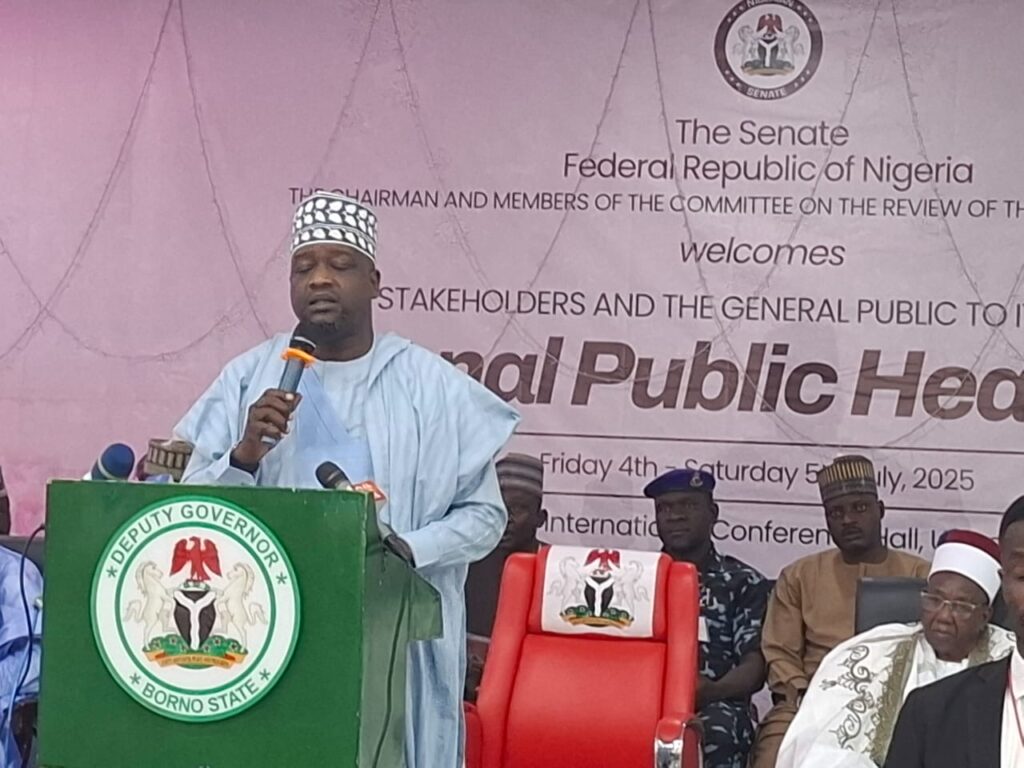As part of efforts to reform Nigeria’s legal framework and address constitutional gaps, the Senate Committee on the Review of the 1999 Constitution has commenced a two-day public hearing to gather citizens’ input on proposed amendments.
The Northeast Zonal session was held at the Indimi International Conference Centre, University of Maiduguri.
The Chairman of the Senate Committee on Constitution Review and Deputy Senate President, Senator Barau Jibrin, stated that the hearings are being conducted simultaneously in Maiduguri, Kano, Jos, Enugu, Port Harcourt, and Ibadan.
Represented by Senate Chief Whip, Senator Mohammed Monguno, Barau emphasized the importance of inclusive public discourse in shaping national reforms.
“The amendments address good governance, institutional strengthening, and national aspirations. However, some issues transcend routine legislative processes and demand deeper commitment to the spirit of the Constitution,” he said.
He acknowledged that the challenges confronting the Nigerian Constitution stem not only from structural gaps but also from societal attitudes and the failure to uphold constitutional values. “As representatives of the people, the National Assembly has a duty to respond to the public’s call for a renewed national outlook,” he added.
In his address, Borno State Governor, Prof. Babagana Zulum, represented by Deputy Governor Alhaji Umar Kadafur, praised the public hearing as a platform for national unity and civic participation.
“Public involvement in constitutional reform fosters ownership, respect for the rule of law, economic progress, and enhanced security. This is a step toward adapting to Nigeria’s evolving political and social realities,” Zulum stated. He reminded participants that their freedom of expression is guaranteed under Section 39 of the 1999 Constitution and encouraged them to submit memoranda freely.
Highlighting the dynamic nature of constitutional governance, Zulum noted that the Nigerian Constitution has undergone five amendments so far, and more will be required in the future. “Even the U.S. Constitution has been amended 27 times in 235 years,” he said.
The Shehu of Borno, Alhaji Abubakar Ibn Garbai Elkanemi, called for a defined constitutional role for traditional institutions. He described the constitution as a human-made law that must evolve with time and realities, urging stakeholders to assign clear responsibilities to royal institutions.
In a presentation from the Federal Ministry of Women Affairs, Hon. Asabe Vilita Bashir, Director-General of the National Centre for Women Development, advocated special legislative seats for women to increase their political representation. “We are demanding one additional Senate seat per state, 74 seats in the House of Representatives, and 104 in state assemblies,” she said, citing countries like Rwanda and Gambia as examples of inclusive governance.
Echoing this position, Mrs. Yabawa Kolo of the Women’s Rights Advocacy Protection Society (WRAPS) also called for reserved seats for women and marginalized groups, including persons with disabilities. She emphasized that financial, cultural, and religious barriers hinder women’s full participation in governance.
Various memoranda were also submitted advocating the creation of new states, including Savannah (Borno), Kwararafa and Murini (Taraba), Amana (Adamawa), Tangale-Waja and Highland (Gombe), and Katagum (Bauchi).
The public hearing continues as the Senate Committee reviews contributions from citizens and stakeholders across the country, with the goal of drafting a more inclusive and responsive constitution.















